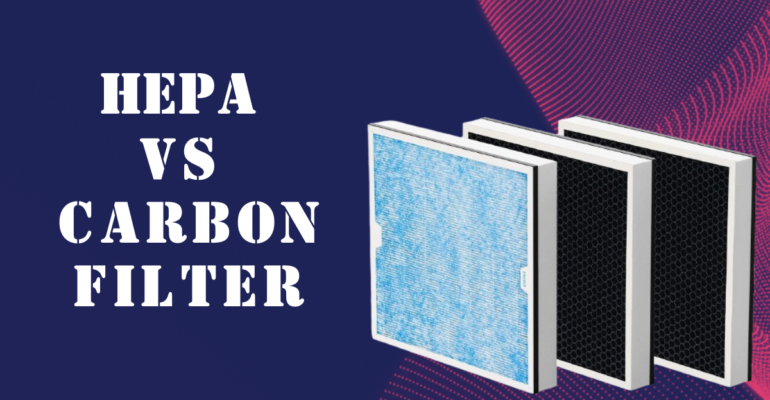Understanding Different Air Purification Technologies: HEPA vs. Carbon Filters
August 16, 2024 2024-08-16 10:37Understanding Different Air Purification Technologies: HEPA vs. Carbon Filters

Understanding Different Air Purification Technologies: HEPA vs. Carbon Filters
Explore the comprehensive guide on HEPA vs. carbon filter technologies and discover how these two popular air purification methods differ in function and effectiveness. In this article, we dive deep into HEPA vs. carbon filter comparisons, explaining how HEPA filters are highly efficient in capturing tiny particles like dust, pollen, and allergens, making them perfect for those with allergies or asthma. On the other hand, we explore how carbon filters specialize in removing odors, gases, and volatile organic compounds (VOCs), making them ideal for eliminating smoke and chemical smells.
By understanding HEPA vs. carbon filter performance, you’ll be equipped to make an informed choice for your home or office air purifier. Whether you need to combat airborne particles or remove unpleasant odors, this guide on HEPA vs. carbon filter options will help you select the best solution for your air quality needs.”
What Is a HEPA Filter?
A HEPA filter is designed to capture particles as small as 0.3 microns with an efficiency of 99.97%. This includes dust, pollen, pet dander, mold spores, and even some bacteria. HEPA filters work by forcing air through a fine mesh that traps harmful particles. Because of their high efficiency, HEPA filters are often recommended for people with allergies or asthma, as they can significantly reduce airborne allergens and improve respiratory health.
How HEPA Filters Work: HEPA filters utilize a combination of mechanisms to trap particles:
- Direct Interception: Particles are trapped when they come into contact with the fibers in the filter.
- Inertial Impaction: Larger particles cannot follow the airstream and collide with the fibers.
- Diffusion: Smaller particles are slowed down by air molecules and eventually captured by the filter fibers.
Strengths of HEPA Filters:
- Highly Efficient: HEPA filters are extremely effective at capturing small particles, making them ideal for removing allergens from the air.
- Reliable: HEPA technology is well-established and widely used in various settings, including hospitals and cleanrooms.
- Maintenance: While they require periodic replacement, HEPA filters are generally low-maintenance.
Limitations:
- No Gas or Odor Removal: HEPA filters do not remove gases, chemicals, or odors from the air.
- Size and Noise: HEPA filters require a fan to push air through the dense material, which can make air purifiers larger and noisier.
What Is an Activated Carbon Filter?
Activated carbon filters, also known as charcoal filters, are highly effective at removing gases, odors, and chemical vapors from the air. These filters are made from a form of carbon that has been treated to increase its surface area, making it highly porous. This porous structure allows the filter to adsorb a wide range of pollutants, including volatile organic compounds (VOCs) and unpleasant odors.
How Activated Carbon Filters Work: Activated carbon filters operate through a process called adsorption, where gases and chemicals are trapped on the surface of the carbon material. As air passes through the filter, contaminants are drawn to the carbon and adhere to its surface, effectively removing them from the air.
Strengths of Activated Carbon Filters:
- Effective at Odor Removal: These filters are excellent at eliminating odors from cooking, pets, smoke, and other sources.
- Chemical Filtration: Activated carbon can remove harmful gases and chemicals, making it ideal for environments with high levels of VOCs or pollutants.
- Versatile: Often used in conjunction with other filters, activated carbon enhances the overall air purification process.
Limitations:
- Not for Particulate Matter: Activated carbon filters do not capture dust, pollen, or other particulates, so they are often used alongside HEPA filters.
- Replacement Frequency: Depending on the level of pollution, activated carbon filters may require frequent replacement to remain effective.
HEPA vs. Activated Carbon: Which Should You Choose?
The choice between HEPA and activated carbon filters depends on your specific air quality needs. Here’s a quick guide to help you decide:
- For Allergens and Particulates: If your primary concern is removing dust, pollen, and other small particles, a HEPA filter is your best option. It’s especially beneficial for people with allergies, asthma, or other respiratory conditions.
- For Odors and Chemical Vapors: If you’re dealing with strong odors, smoke, or harmful gases, an activated carbon filter is more effective. It’s ideal for environments where air quality is compromised by chemical pollutants or persistent odors.
- For Comprehensive Air Purification: Many air purifiers combine HEPA and activated carbon filters to provide a comprehensive solution. This combination allows you to tackle both particulate matter and gaseous pollutants, ensuring cleaner, fresher air.
Conclusion
Understanding the differences between HEPA and activated carbon filters is crucial in selecting the right air purifier for your needs. While HEPA filters excel at removing fine particles and allergens, activated carbon filters are unmatched in their ability to eliminate odors and chemical vapors. By choosing the right technology—or a combination of both—you can ensure that your indoor environment is as clean and healthy as possible.



